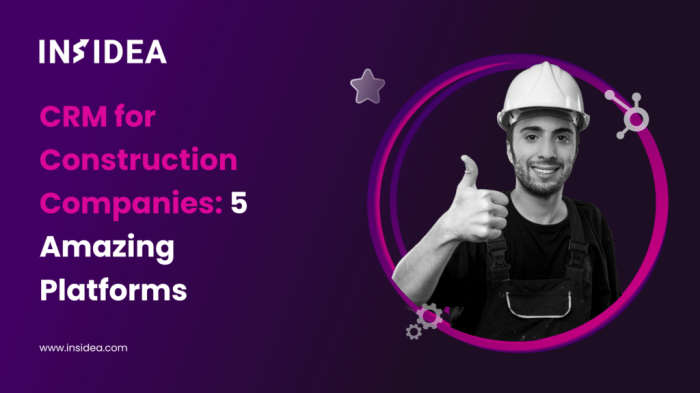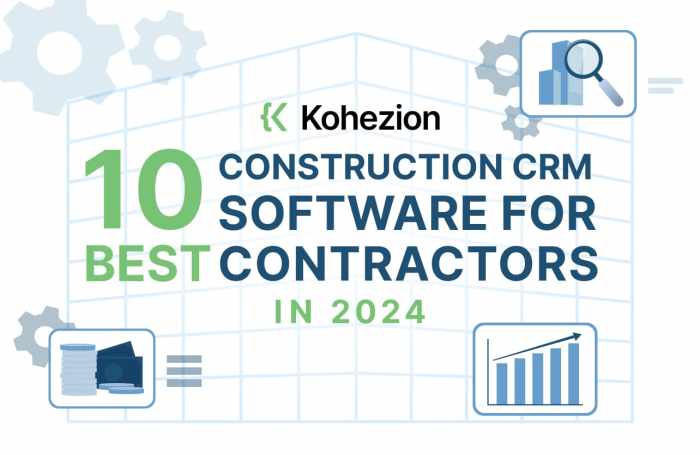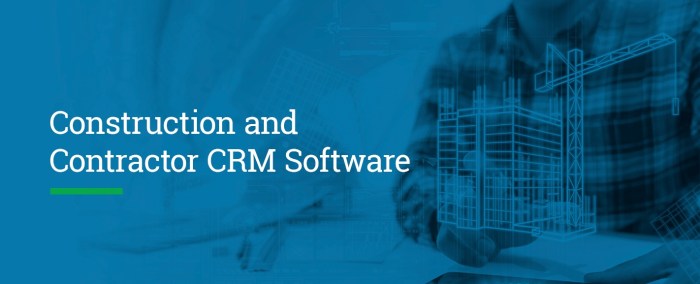Crm software for construction companies – The construction industry, known for its complexity and demanding projects, often struggles with managing client relationships, project details, and team communication effectively. This is where Customer Relationship Management (CRM) software steps in as a powerful tool to streamline operations and boost profitability. A well-implemented CRM system can significantly improve efficiency, enhance collaboration, and ultimately lead to greater success for construction companies of all sizes.

Source: insidea.com
Why Construction Companies Need CRM Software
Traditional methods of managing client interactions, such as spreadsheets and email chains, quickly become unwieldy as projects increase in number and complexity. A dedicated CRM system offers a centralized hub for all crucial information, providing several key benefits:
Improved Client Relationship Management
- Enhanced Communication: Centralized communication logs ensure everyone on the team is on the same page, reducing miscommunication and delays.
- Personalized Interactions: Track client preferences, project history, and communication details to personalize interactions and build stronger relationships.
- Increased Client Satisfaction: Proactive communication, timely updates, and efficient issue resolution contribute to higher client satisfaction and positive reviews.
- Lead Management: Effectively manage leads from initial contact through to project completion, ensuring no potential opportunity is missed.
Enhanced Project Management
- Centralized Project Information: Store all project-related documents, schedules, budgets, and communication in one accessible location.
- Improved Collaboration: Team members can easily access and update project information, fostering seamless collaboration and reducing conflicts.
- Task Management: Assign tasks, track progress, and manage deadlines effectively, ensuring projects stay on schedule and within budget.
- Real-time Reporting: Monitor project progress, identify potential issues, and make data-driven decisions to mitigate risks.
Boosting Team Productivity and Efficiency, Crm software for construction companies
- Automated Processes: Automate repetitive tasks such as email marketing, appointment scheduling, and report generation, freeing up time for more strategic work.
- Improved Time Management: Streamlined workflows and readily available information save valuable time and improve overall team productivity.
- Better Resource Allocation: Track resource utilization and allocate resources effectively, optimizing project timelines and minimizing costs.
- Data-Driven Insights: Analyze data to identify trends, optimize processes, and make informed decisions to improve efficiency and profitability.
Key Features of Construction CRM Software
While specific features vary depending on the software provider, many construction CRMs share common functionalities crucial for success. These include:
Contact Management
A robust contact management system allows you to store and manage all client and stakeholder information, including contact details, communication history, and project involvement. This ensures easy access to crucial information whenever needed.
Lead Management
Effective lead management tools help you track potential clients from initial contact to project completion. Features such as lead scoring and automated follow-ups help nurture leads and convert them into paying customers.
Project Management Capabilities
Integrated project management tools allow you to track project progress, manage tasks, allocate resources, and monitor budgets. Real-time reporting and dashboards provide valuable insights into project performance.
Document Management
Centralized document storage and management ensure all project-related documents are readily accessible to authorized personnel. This eliminates the need for searching through emails or physical files.
Reporting and Analytics
Comprehensive reporting and analytics features provide valuable insights into key performance indicators (KPIs), helping you identify areas for improvement and make data-driven decisions.
Integration with Other Software
Seamless integration with other software applications, such as accounting software and project management tools, ensures data consistency and streamlines workflows.
Choosing the Right CRM for Your Construction Business
Selecting the appropriate CRM software involves considering several factors:
- Size of your company: Smaller companies may benefit from simpler, more affordable solutions, while larger enterprises may require more comprehensive systems.
- Specific needs: Identify your key requirements and prioritize features that align with your business goals.
- Budget: CRM software pricing varies widely, so setting a realistic budget is essential.
- Integration capabilities: Ensure the CRM integrates seamlessly with your existing software applications.
- Ease of use: Choose a user-friendly system that is easy for your team to learn and adopt.
- Scalability: Select a CRM that can grow with your business as your needs evolve.
Examples of CRM Software for Construction
Several CRM platforms cater specifically to the needs of construction companies. Researching and comparing options is crucial to finding the best fit. Some popular options include (but aren’t limited to):
- CoConstruct: Known for its project management features and integration with other construction-specific tools.
- Buildertrend: A comprehensive platform offering project management, client communication, and financial tracking capabilities.
- Salesforce: A highly customizable platform adaptable to various industries, including construction, though often requiring more extensive setup and configuration.
- HubSpot: A popular CRM with a strong focus on marketing and sales automation, suitable for companies focusing on lead generation.
Frequently Asked Questions (FAQ)
- Q: How much does construction CRM software cost? A: Pricing varies significantly depending on the software, features, and number of users. Expect to pay anywhere from a few hundred dollars per month to several thousand.
- Q: Is CRM software difficult to learn? A: Most modern CRMs are designed to be user-friendly. However, the learning curve depends on the complexity of the software and your team’s technical proficiency. Many offer training and support resources.
- Q: Can CRM software integrate with my existing accounting software? A: Many CRMs offer integration capabilities with popular accounting software packages. Check the specific software’s compatibility before purchasing.
- Q: How long does it take to implement a CRM system? A: Implementation time depends on the complexity of the system and the size of your company. It can range from a few weeks to several months.
- Q: What are the key metrics to track with a construction CRM? A: Key metrics include lead conversion rates, project completion rates, client satisfaction scores, and resource utilization.
Conclusion: Crm Software For Construction Companies
Implementing a CRM system is a strategic investment that can significantly improve efficiency, enhance client relationships, and boost profitability for construction companies. By carefully considering your specific needs and choosing the right software, you can unlock the full potential of your business and streamline your operations for greater success.
References
Call to Action
Ready to transform your construction business with the power of CRM? Contact us today for a free consultation and let us help you find the perfect solution to meet your specific needs.
Questions Often Asked
What types of data can a construction CRM manage?
Construction CRMs manage diverse data including client information, project details (schedules, budgets, milestones), material orders, subcontractor contacts, and document storage.

Source: kohezion.com
How does a CRM improve client communication?
CRMs centralize communication, ensuring all team members have access to client interactions and project updates. This reduces miscommunication and improves response times.
Can a CRM integrate with other software used in construction?

Source: simplesalestracking.com
Many CRMs offer integrations with accounting software, project management tools, and other industry-specific applications, creating a streamlined workflow.
What is the cost of implementing a construction CRM?
Costs vary greatly depending on the chosen software, the number of users, and required features. Some offer tiered pricing plans, while others require custom quotes.
How long does it take to implement a construction CRM?
Implementation timelines depend on the system’s complexity and the company’s size. It can range from a few weeks to several months.
